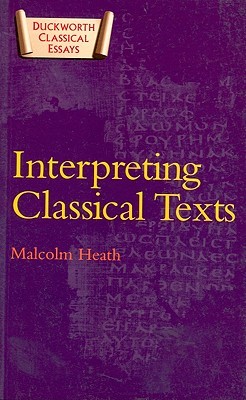
- We will send in 10–14 business days.
- Author: Malcolm Heath
- Publisher: Bristol Classical Press
- ISBN-10: 0715631748
- ISBN-13: 9780715631744
- Format: 13.5 x 21.4 x 1.3 cm, softcover
- Language: English
- SAVE -10% with code: EXTRA
Reviews
Description
How should I interpret a classical text? However I interpret it, someone else will so do differently, and even the nature of the interpreter's task is a matter of dispute; consensus is not a realistic prospect. Malcolm Heath sees the inevitability of such disagreements, not as a problem to be deplored, but as a constructive force, at once an essential part of the process of enquiry and a reflection of the endless diversity of the questions that interest the readers of classical texts. Accordingly he argues for an approach to interpretation that is theoretically reflective and committed to an open-ended, yet rigorously critical, pluralism. Against that background he examines a range of issues in literary theory, including the nature and significance of authorial intention, the relevance of context and reception, and the possibility and value of historically oriented interpretation.
EXTRA 10 % discount with code: EXTRA
The promotion ends in 20d.17:53:13
The discount code is valid when purchasing from 10 €. Discounts do not stack.
- Author: Malcolm Heath
- Publisher: Bristol Classical Press
- ISBN-10: 0715631748
- ISBN-13: 9780715631744
- Format: 13.5 x 21.4 x 1.3 cm, softcover
- Language: English English
How should I interpret a classical text? However I interpret it, someone else will so do differently, and even the nature of the interpreter's task is a matter of dispute; consensus is not a realistic prospect. Malcolm Heath sees the inevitability of such disagreements, not as a problem to be deplored, but as a constructive force, at once an essential part of the process of enquiry and a reflection of the endless diversity of the questions that interest the readers of classical texts. Accordingly he argues for an approach to interpretation that is theoretically reflective and committed to an open-ended, yet rigorously critical, pluralism. Against that background he examines a range of issues in literary theory, including the nature and significance of authorial intention, the relevance of context and reception, and the possibility and value of historically oriented interpretation.


Reviews